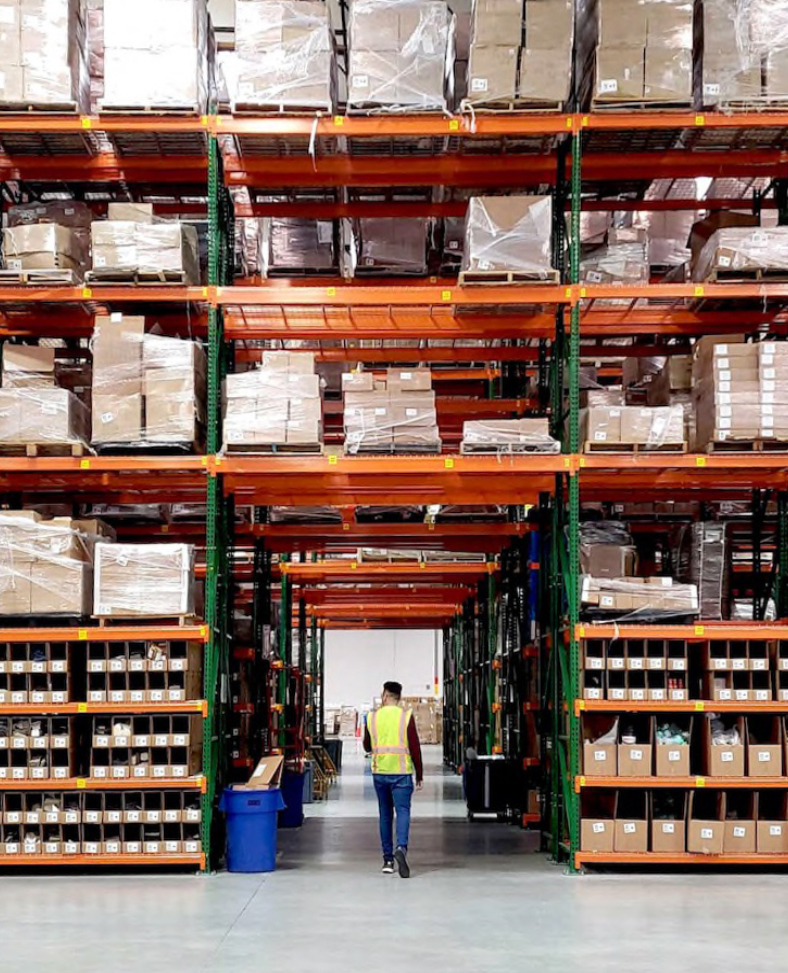Logistics and supply chain management are critical components of running a successful business. The sector has boomed in recent years. By 2031, the global third-party logistics market is expected to reach $2.8 trillion. As companies grow and become more complex, they often need to outsource some of these functions to third-party logistics (3PL) providers or fourth-party logistics (4PL) providers. But the common question that arises is: Which to Choose in 3PL vs 4PL?
3PL and 4PL refer to companies that provide logistics services to other companies. They manage functions like warehousing, transportation, inventory management, order fulfillment, and more so that their client companies can focus on their core business.
At a high level, 3PL refers to companies that handle the execution and day-to-day logistics operations. 4PL refers to companies that take on more of a consultative role in supply chain management and oversee 3PLs.
What is 3PL?
3PL refers to a company that provides outsourced logistics services to businesses for part or all of their supply chain management. 90% of companies featured in the Fortune 500 use 3PL.
Some key features and benefits of 3PL include:
1. Transportation Services
3PL providers can arrange and execute transportation of goods via air, ocean, rail, or truck. This removes the burden of transportation coordination from the shipper.
2. Warehousing Services
3PLs can provide warehouse storage space and perform inventory management, picking/packing, and shipping services for shippers. This allows shippers to avoid investing in their warehouse infrastructure.
3. Inventory Management
3PL providers can manage inventory for shippers by tracking stock levels, monitoring turnover, and providing inventory visibility through their technology solutions. This gives shippers better control over their inventory.
Read Also: How to measure Inventory Health?
4. Order Fulfillment
3PLs can handle order processing, picking, packing, shipping and returns management for eCommerce and omnichannel sellers. This simplifies fulfillment operations for shippers.
5. Logistics Technology
3PL providers invest in transportation management systems (TMS), warehouse management systems (WMS), EDI, tracking/visibility tools, etc. Shippers can leverage these technologies without having to purchase their own.
6. Flexibility & Scalability
Shippers can quickly scale logistics operations up or down as needed by using a 3PL. This is especially beneficial for handling seasonal peaks or temporary needs.
7. Cost Savings
Outsourcing to a 3PL can lower a shipper’s logistics costs since the 3PL specializes in logistics and can achieve economies of scale.
Some common services offered by 3PL providers include:
- Transportation management: This includes planning and executing the movement of goods across inbound and outbound shipments. 3PLs have relationships with carriers that businesses can leverage.
- Warehousing and fulfillment services: 3PLs handle warehousing, inventory management, order processing, fulfillment and shipping. They have the warehouse space, technology and labor to handle these functions.
- Inventory management: 3PL providers can manage your inventory levels, inventory tracking, reporting and analytics. This provides real-time visibility into inventory status.
- Freight forwarding: 3PLs act as freight brokers and intermediaries to arrange the transport of goods domestically or internationally. This includes preparing documentation and managing customs clearance.
- Reverse logistics: 3PLs manage product returns, repairs, refurbishment and proper disposal.
What is 4PL?
4PL, or fourth-party logistics, is an advanced form of supply chain management that goes beyond the services offered by 3PL providers. 4PL focuses more on supply chain integration and management rather than logistics execution.
A 4PL provider essentially serves as a supply chain manager, bringing together the client company, 3PLs, and other partners to design and manage the overall logistics process. The 4PL provider acts as an integrator that oversees the entire supply chain and logistics operation.
While 3PLs handle execution and fulfillment, 4PLs oversee and orchestrate the bigger picture. 4PLs assemble the best 3PL and transportation providers for each part of the client’s supply chain.
Some key benefits of using a 4PL include:
1. Holistic supply chain visibility and integration
The 4PL provider has end-to-end visibility across the supply chain and integrates data and processes from all partners. This enables optimization across the entire chain.
2. Cost savings from efficiencies
By managing the whole supply chain, the 4PL can drive efficiencies and cost savings that individual 3PLs can’t achieve separately.
3. Higher level of expertise and innovation
4PLs provide extensive supply chain expertise to drive innovation, emerging technologies, and continuous improvement.
4. Flexibility and ability to change 3PLs
The 4PL can easily switch 3PLs or carriers to adapt to changing business needs.
5. Focus on core competencies
Using a 4PL allows companies to focus on their core business strengths rather than supply chain management.
Key Differences Between 3PL and 4PL
The key differences between 3PL and 4PL largely come down to the level of control and outsourcing, types of services offered, pricing models, and technology integration.
| Service Aspect | 3PL | 4PL |
| Asset Ownership | Owns warehouses, transportation fleets, and inventory | Does not own assets, oversees and manages 3PLs |
| Scope of Services | Warehousing, transportation, and inventory management | Broader supply chain integration and optimization |
| Level of Control | Less control and visibility for shippers | Greater control over the supply chain for shippers |
| Focus Areas | Logistics execution | Overall supply chain strategy and optimization |
| Customization | Standardized services | Highly customized solutions |
| Pricing Model | Transactional (based on activities handled) | Strategic (based on value-added) |
| Technology | Proprietary technology | Integrates systems across multiple 3PLs |
| Expertise | Operational expertise | Robust supply chain management expertise |
Which Model is Better For Your Business?
Deciding between 3PL and 4PL depends on your business’s unique needs and capabilities.
Here are some key factors to consider:
1. Business Size
Small businesses may benefit more from 3PL, which offers basic warehousing and shipping services. As you grow, you may eventually outgrow 3PL.
Larger businesses often need the advanced supply chain capabilities of a 4PL. However, small and mid-sized companies can also utilize 4PL if they have complex logistics needs.
2. Supply Chain Complexity
Companies with simple, linear supply chains can be well-served by a 3PL provider.
Businesses with multi-node, global supply chains will benefit from the specialized expertise of a 4PL. The 4PL can optimize and coordinate complex logistics operations across many facilities, geographies and modes of transport.
3. Technology Capabilities
3PLs offer basic logistics technology like WMS. However, they need the sophisticated IT integration capabilities of a 4PL.
A 4PL can provide complex logistics visibility, predictive analytics, optimization, and other tech-enabled services. This allows for greater supply chain automation, agility and cost efficiency.
4. Control and Oversight
With 3PL, you directly manage logistics operations, while outsourcing the execution.
4PL relinquishes control over execution and management. This hands-off approach provides convenience but can also entail risks around accountability.
5. Cost Considerations
3PL contracts are generally more affordable for basic transportation and warehousing needs.
4PL has higher service fees but can drive larger long-term cost savings through supply chain optimization. The ROI depends on your scale, complexity, and logistics spending.
How ShipTop Can Help?
ShipTop is a Canadian-based fulfillment center that offers both 3PL and 4PL solutions to businesses of all sizes. Our team has over 10 years of experience managing complex supply chains and providing optimized logistics services.
As a 3PL, we provide warehousing, distribution, transportation, and freight forwarding services. Our nationwide fulfillment centers are equipped with state-of-the-art inventory and order management systems. We handle storage, picking, packing, shipping, and returns on your behalf. Our transportation network allows us to provide cost-effective LTL, FTL, parcel, and intermodal shipping across North America.
As a 4PL, we are a single point of contact to manage your entire logistics operation. Our logistics experts design, implement, and optimize your supply chain strategy. We have experience selecting the right 3PL partners, negotiating rates, managing contracts, overseeing operations, and providing real-time analytics. This allows you to focus on your core business while we focus on your logistics.
Wrapping Up
3PLs are asset-based logistics providers that own warehouses, and fleets, and handle the execution of logistics functions like transportation, warehousing, and freight forwarding. On the other hand, 4PLs are non-asset-based and focus more on supply chain management, logistics coordination, optimization, and orchestration. They subcontract 3PLs for execution.
3PLs handle the tactical, day-to-day logistics activities whereas 4PLs take a more strategic approach to overall supply chain optimization. 3PLs have more control over operations and costs while 4PLs provide more visibility and flexibility across the supply chain.
3PLs are a one-stop shop but can be limited in capabilities whereas 4PLs integrate multiple 3PLs to provide an end-to-end solution.
Weigh your business needs and supply chain complexity to determine if a 3PL or 4PL model is better. Reach out for a consultation for a well-optimized eCommerce fulfillment strategy and the best logistics approach for your unique requirements.




